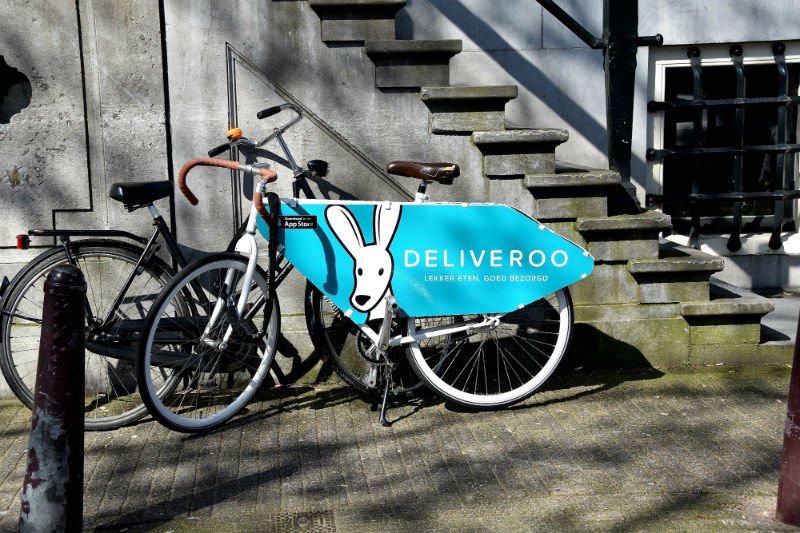
The Guardian has recently unearthed an internal communication by Deliveroo, the online food delivery company, to its managers which instructs them on the words to use, and not to use, when describing the relationship between the company and its couriers. The managers are told that the couriers should be called ‘independent suppliers’, not employees; they wear ‘kit’, not uniform; they are paid ‘fees’, not wages and so on.
The missive is clearly a response to unrest amongst Deliveroo’s workforce. Like Uber, another giant in the gig economy that has grown from nothing to a global player in a few short years, it has hit a few bumps in the road over its treatment of the people who deliver its services. The company has faced strike action and legal challenges because it doesn’t pay couriers and drivers for sick leave, holiday or the other benefits to which employees are usually entitled.
Deliveroo may argue that it doesn’t employ couriers, but it has certainly employed the power of language in fighting the claims against it. The list reveals a truth that we all know but very rarely think about: language doesn’t just describe the world, it helps to shape it. Some say that Deliveroo couriers are employees in all but name – but the company is clearly aware of how important that name is! Its missive is an example of the politically-inflected nature of language, something which manifests itself in all sorts of ways.
The use of language to change perceptions is not new in the business world – euphemistic terms such as ‘downsizing’ ‘rightsizing’ and ‘restructuring’ may not sound as ruthless as ‘cutting jobs’ but they spell trouble for employees nonetheless. Such language practices are not restricted to business. Words such as ‘collateral damage’ and ‘rendition’ have been coined or purloined to obscure far more brutal actions than those of a company cutting jobs to stay afloat. Of course, the use of new words or old words in new ways to promote a certain worldview is not only the preserve of those wishing to hide dubious or deadly practices. Terms such as ‘gay’ or ‘special needs’ are now well-established but were originally introduced to counter negative perceptions of particular minority groups.
It could be said that all the examples above actually reveal the limits of language’s power. After all, the very existence of the Guardian article shows that people are aware of the processes at work when language is used to manipulate perceptions. Terms such as ‘collateral damage’ are usually uttered or written with a disclaimer, ‘gay’ has become a term of abuse among young people (although the extent to which it carries homophobic intent is disputed), ‘special needs’ still carries a certain stigma, and so on. However, this misses an important point about the nature of language, and one which the Deliveroo dos-and-don’ts list helps illustrate.
In advising its managers to use a word like ‘kit’, the company not only avoids ‘uniform’ with all its connotations of belonging and uniformity/conformity, but also draws on flavours of other usages of ‘kit’. Most obviously, it is used in a sporting context but it also carries subtler associations to do with a certain trendiness and modern outlook. Linguists have long been aware that words pick up and carry forward meanings from their contexts of use and that audiences absorb these associative meanings without necessarily being aware of them. The words become overlayered with the sediment of familiarisation and this often hides their associative meanings from conscious appraisal. Politicians and advertisers have long been aware of the ideological effect of overlaying language with the sediment of familiarisation. And they achieve that effect through a very simple technique - repetition: ‘elites’ are ‘liberal’ (or maybe, ‘liberals’ are ‘elite’), ‘lefties’ are ‘loony’, ‘Islam’ is ‘radical’, ‘capitalism’ is ‘unbridled’ and ‘beans’ (or should I say ‘beanz’) still means ‘heinz’! By these means, the adjectives infect the nouns they describe until the word ‘Islam’ carries the notion of radicalism without the word ‘radical’ having to be used.
However, these overlayered and taken-for-granted terms to describe the world around us can be disturbed and exposed. For example, the feminist movement brought to the surface how referring to humanity as ‘mankind’, labelling the police force as ‘policemen’ and calling groups of women ‘girls’ carries ideological freight which ultimately helps perpetuate gender inequalities. Overhauling ingrained language usage may not of itself change the status quo, but it is an essential element in that process.
By their very nature, the embedded, taken-for-granted ideological meanings of particular words and phrases are hard to uncover. Yet being aware of the processes by which they take hold is a step in countering their effects. In the dispute over pay and conditions between Deliveroo and its couriers, the battle of words plays a central role.
Rate and Review
Rate this article
Review this article
Log into OpenLearn to leave reviews and join in the conversation.
Article reviews